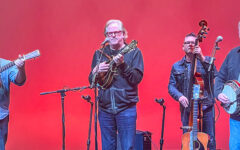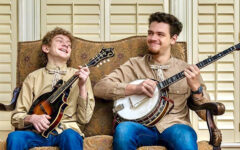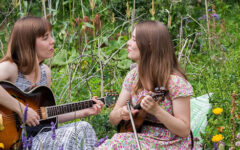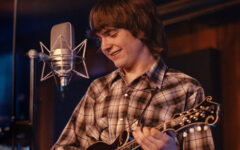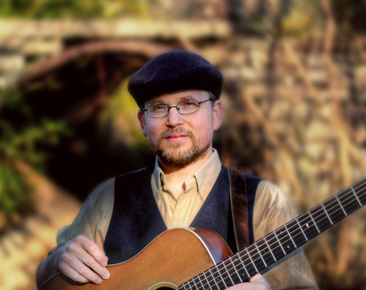
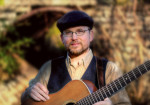 Ron Block is best known as a member of the band Alison Krauss and Union Station. Individually, he has carved out a solid career as a singer-songwriter. Bluegrass Today contributor Lisa Jacobi spoke with Ron when they both attended an album release party for their friend, the children’s book author Sandy Boynton, at the Loveless Barn south of Nashville, Tennessee. Before diving in to the column below, first watch the “Backstage Pass” video shot last week in Chattanooga during a sound check for Ron’s show with Sierra Hull and Mark Fain.
Ron Block is best known as a member of the band Alison Krauss and Union Station. Individually, he has carved out a solid career as a singer-songwriter. Bluegrass Today contributor Lisa Jacobi spoke with Ron when they both attended an album release party for their friend, the children’s book author Sandy Boynton, at the Loveless Barn south of Nashville, Tennessee. Before diving in to the column below, first watch the “Backstage Pass” video shot last week in Chattanooga during a sound check for Ron’s show with Sierra Hull and Mark Fain.
There are those who would like to place bluegrass music under a glass bell jar and try to restrict it to a moment in time. But their attempt would be an unfortunate study in how to suck the artistry from art, and that is not how our music – bluegrass music – was intended.
Bluegrass music evolved from the influences of Europe, accented by the creativity of our nation’s earliest citizens, who were dealing with the unexpected actions of nature and challenged by inexplicable life crises and spiritual mysteries. This generation gained inspiration from the love of family and the sadness in loss.
In previous centuries, there were few expectations, let alone condemnations, placed on reinventing the music of the royal courts and village squares. Over time that same music found itself in the new world being played on cabin porches – and eventually, by way of car and bus, arriving in yet another musical form to the outposts of rural Oprys and clear-voice radio stations.
Bluegrass music is alive because it is allowed to breathe – first deeply in, then pushing out – with a transient resting place somewhere in the middle.
The founding father of what became labeled as bluegrass music, and his first-generation music mates, pulled from the past and pushed to the future. Their bluegrass music came from an artistic drive to give new life to those lyrics of the old, existent tunes and musical sounds.
And here we are now in the holiday season of winter with its shortened days and quiet nights. For many bluegrass music artists, this is the time of year when heavy touring goes into a bit of hibernation, allowing for stillness and the creative space needed for songwriting and tune crafting.
Which brings us to Ron Block.
 Ron and his writing partner, the poet and lyricist Rebecca Reynolds, have released the magical Advent song Come, Children of This Long, Discarded Night. The song is beautifully performed by Ron, Jeff Taylor, Luke Bulla and Julie Lee. Through it, Ron reveals the musical landscape that lies beyond the boundaries of the bluegrass norm and certainly beyond the music he has played for years with his band mates in the phenomenally popular Alison Krauss and Union Station.
Ron and his writing partner, the poet and lyricist Rebecca Reynolds, have released the magical Advent song Come, Children of This Long, Discarded Night. The song is beautifully performed by Ron, Jeff Taylor, Luke Bulla and Julie Lee. Through it, Ron reveals the musical landscape that lies beyond the boundaries of the bluegrass norm and certainly beyond the music he has played for years with his band mates in the phenomenally popular Alison Krauss and Union Station.
On first listen, you may think the song is a departure from what we in the bluegrass music community have come to expect from Ron. But we shouldn’t be too surprised, as his most recent collaborative album with Rebecca, Walking Song, is illustrative of the creative slant his artistic soul has developed after he agilely launched, in 2001, a solo career to run parallel with his AKUS responsibilities. Both of these recent projects ring throughout with the same ancient sounds, instrumentation and influences that are the heritage-blood of bluegrass music.
“Until pretty recently, I was a confirmed band member for so many years, and my whole focus was Union Station,” said Ron. “After a while, you do something long enough, you start believing that’s you. Really it was just a role I had stepped into, and now that there have been large amounts of time off from the band I’ve had to really think about that. Because there really is nowhere else that role works. There aren’t any other bands where I can play like that. It only fits the one thing. So now I have to say ‘Wait a minute what do I really like? What kind of music do I like to play?'”
Along with being a veteran itinerant musician, Ron is representative of the guild of authentic songwriters and gifted musical artists who are not pushed by self, but instead are pulled by a force that heralds them to no other task.
“Writing comes from a place of faith and fullness.” – Ron Block
“I think part of it is coming from some other place, at least if it’s not just clinical craft. But then there is a craft side to it, the experience and the knowledge to know what to do when that inspiration is hitting you.”
“Lots of points in my life, my craft wasn’t good enough and I thought I had to do it, I had to make a good song and all this pressure twisted it sideways. Then the song doesn’t come out right and you get a distorted message –it is not what it was meant to be.”
“What I’ve found is to go back to that original: ‘What did God make me for, why was I created?’ And one of the reasons I know I was created is to play music, to write music and to do this. So returning to that basic foundation belief has kind of turned me in a different direction these last couple of years.”
Though he confides readily that he still “gets in my own way,” Ron is in a prolific songwriting phase spurred by his creative partnership with Rebecca.
“She has taught me so much about creativity and the nature of it, and how you have to create from faith and fullness and not from a sense of lack of trying to make this song, but simply letting the song.”
I recorded a podcast interview with Ron while we stood under a street light at the front entrance to the Loveless Barn.
Because we were attending an event that was geared towards children, they were regularly coming in and out of the door, chattering away (like children do). You can hear it all in the podcast interview at Artist2Artist with Lisa Jacobi. I encourage you to listen to the entire podcast to hear Ron discuss his musical relationship with AKUS, books and people who inspire him, and his admiration for his banjo contemporary Jens Kruger. I’ve provided links to Ron’s favorite reads and his music in the resources area below the podcast. Thanks for reading. I’ll be back here at Bluegrass Today on the next full moon, interviewing singer-songwriter Larry Cordle.
Until then, play nice on the planet.
LxoJ

